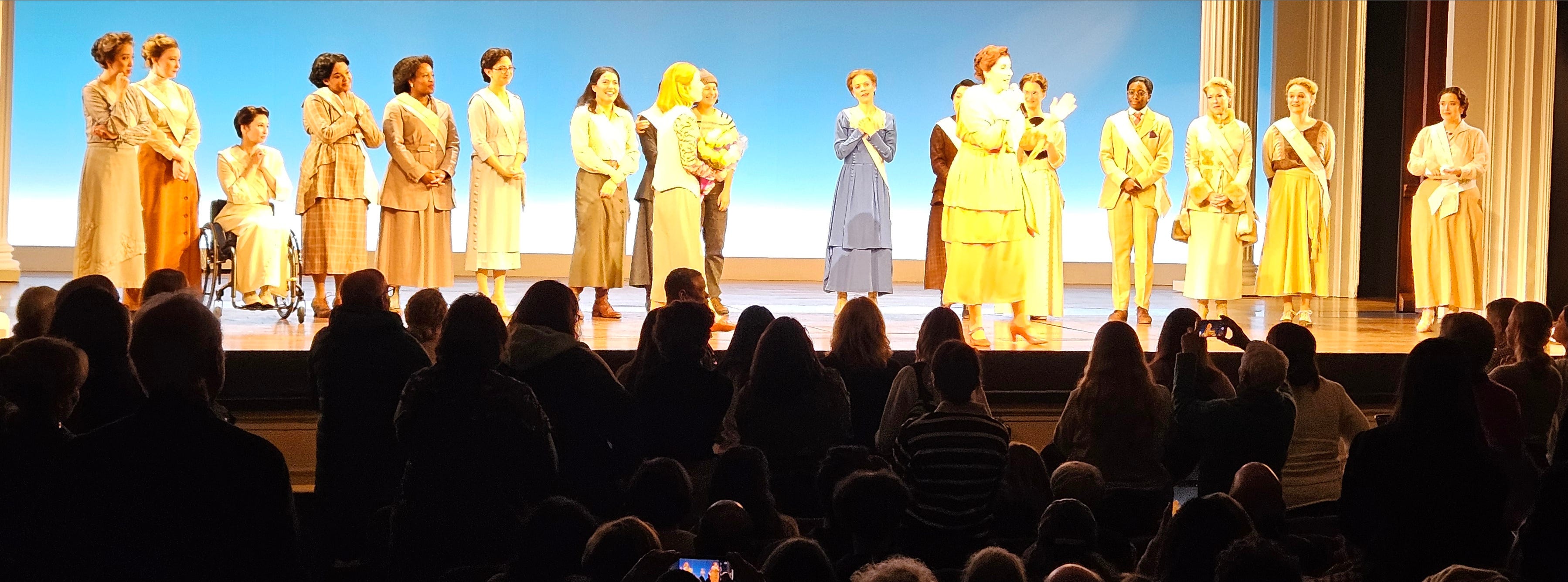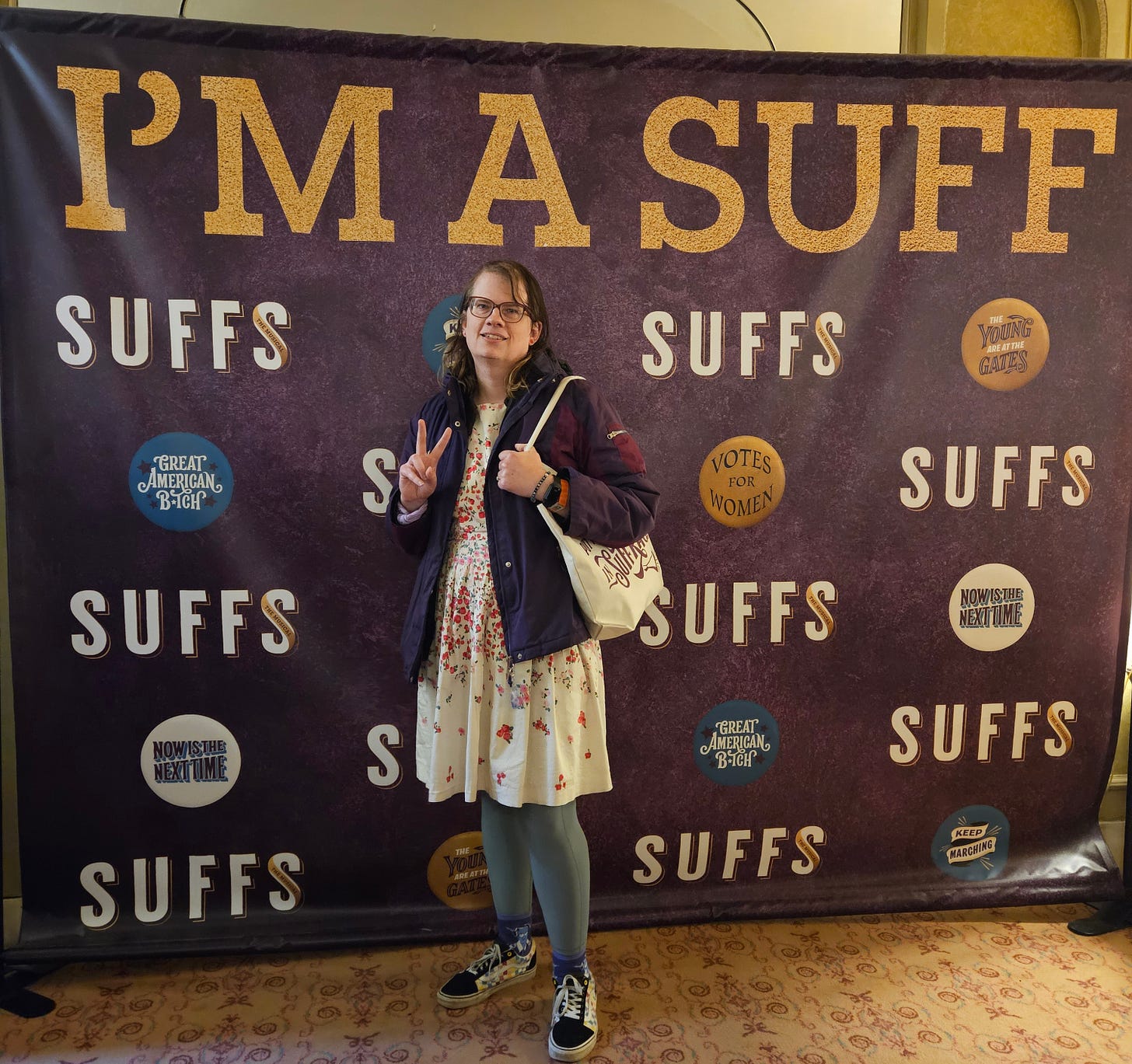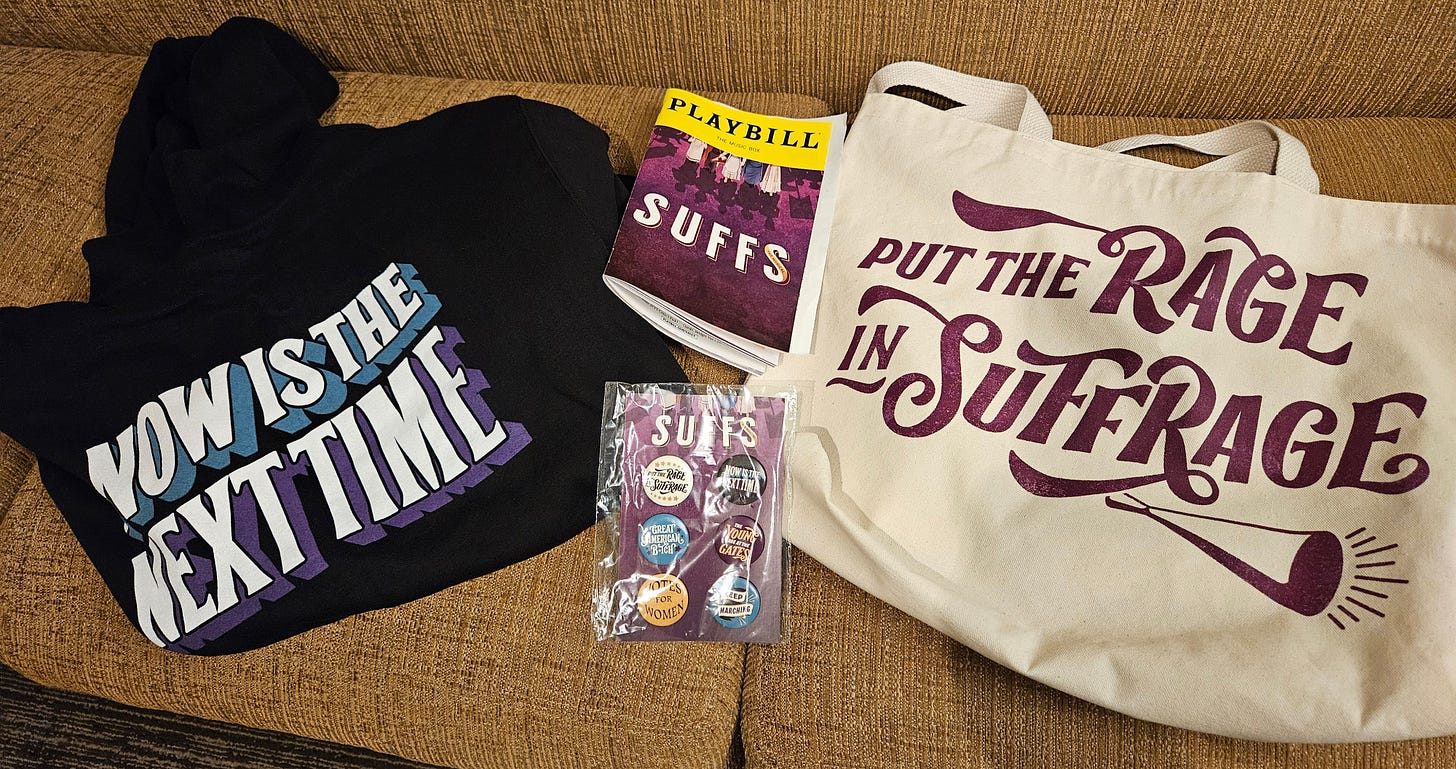SUFFS the Musical
On Broadway for One Final Week!
SUFFS is a musical that is currently on Broadway. It centers the story of Alice Paul and her allies. Paul is a personal hero of mine. My favorite movie quote is from her character in Iron Jawed Angels, one of the few movies I own a copy of. In the movie she talked about how her mother always said, “If you put your hand to the plow you finish the row.” In SUFFS she sings that her mother said, “Try to remember what your mother taught you, when you dip your pen in ink, you can't quit till it runs dry.” The real quote from Alice Paul is, “When you put your hand to the plow, you can't put it down until you get to the end of the row,” which isn't as catchy as the artistic interpretations of it. I still prefer the movie quote as I think it more reflects the Quaker work ethic that Paul was brought up with and the Musical version is a bit too Hamilton for me.
There were no men in the cast, which I found refreshing as men have historically dominated the stage. The reason William Shakespeare had an all male cast was because it was illegal for women to act in England until 1661, decades after his death! The cast in the performance I attended included Hawley Gould a non-binary actor who played Alice Paul. While I’m sure Shania Taub, who usually plays Alice Paul, is excellent, I loved Gould’s performance. At the end of the show Ally Bonino, who played Lucy Burns, thanked Gould for keeping the cast safe as the dance captain (there was a controlled fire in one scene) and for their final performance of Paul before the show closes. The suffragist colors are purple, gold, and white, just like the non-binary flag. Ada Westfall, an openly trans woman, was also part of the cast and did an excellent job playing several roles including the prison matron.
SUFFS did a better job of covering the impact of race in the fight to vote than Iron Jawed Angels. The character Ida B. Wells, excellently played by Nikki M. James, said, “Us lucky ones born both female and black.” She chastised Paul saying, “I hear you quote Frederick Douglass on your soapbox, intending to include and impress us. But in the press, you play down our involvement, and here behind closed doors, you attempt to suppress us.” Wells went on to say they need to get the government to put a stop to lynchings. James’ performance brought me to tears.
SUFFS also included a portrayal of Mary Church Terrell, a black woman who fought for the vote alongside Paul. The real life Terrell was the president of the National Association of Colored Women and their motto, which she created, of “Lifting As We Climb” was featured in the performance.
Gay bars were popular in 1960s San Francisco, but due to transphobia, trans folk were often unwelcome, which as I discussed in my memoir, helped to lead to the Compton Cafeteria Riots. I equate this to the racism of white suffragists. Some of the suffragists justified their actions by saying it would be too complicated to include black women in the movement. Some were just plain racist, and I cannot excuse them. There were some, however, who were not racist and fought for female inclusion.
My only disappointment in SUFFS was that Ruza Wenclawska was written as comic relief. Comic relief is important. I think, however, Iron Jawed Angels did a better job of humanizing the Polish immigrant that became a union organizer and factory inspector. In real life she butted heads at times with Paul because they disagreed on the importance of having the National Women’s Party be openly pro-labor.
Doris Stevens is the author of Jailed for Freedom, which I read in 2022 and recommend for insight into the battle for suffrage. In SUFFS, Nadia Dandashi brought Stevens to life pointing out how marriage equaled death. Contraceptives were federally illegal, all property was considered to be owned by the male spouse, and husbands could beat their wives. After they won the vote Stevens married Wilson’s former Secretary of State, Dudley Malone. In the musical, Malone was portrayed by Tsilala Brock and broke from Wilson when Wilson refused to support Suffrage.
While the vote was won a little over 100 years ago, the story is relevant today. While contraceptives are currently legal, states now decide if abortion is legal and the federal government might choose to make it illegal. We have a vice president elect that thinks “childless cat ladies” aren’t valuable in society. Woodrow Wilson was portrayed by Grace McLean, talking about how, “a female wants to focus on her family”, and that ladies need to be protected from politics polluting our lives. SUFFS discusses how tariff reform was what he had to prioritize over suffrage. While the president-elect has the opposite views of tariffs (ie: more tariffs instead of less), it’s something he says is a priority.
After the vote was won, the straight white characters in SUFFS celebrated. The black characters lamented that while black men technically had the right to vote because of lynchings black men were prevented from voting and they similarly expected to be blocked. Today there are several ways black folks are prevented from voting, and due to gerrymandering even when they vote it’s often in a district where their vote won’t matter. One of the biggest challenges to voting today is that incarcerated men (who are primarily black due to our racially weaponized justice system and prison industrial complex) are banned from voting. Black folks are also more likely to be killed by police. States also keep working on ways to suppress votes including strict ID requirements.
Transgender folks also face voter suppression. When Doris Stevens and Dudley Malone celebrated in SUFFS that they could finally marry, a lesbian couple composed of Carrie Chapman Catt, portrayed by Kirsten Scott, and Mollie Hay, portrayed by Jaygee Macapugay, lamented that they couldn’t get married. The Defense of Marriage act federally prohibited marriage and was signed into law by President Bill Clinton. It wasn’t until ten years ago that the supreme court ruled on Obergefell v. Hodges made it so the entire country had marriage equality. At the same time the Supreme Court overturned abortion rights at the federal level, Justice Thomas said that other Supreme Court rulings, including Obergefell v. Hodges could also be overturned.
After winning the vote, Paul went on to write the Equal Rights Amendment (ERA). In 2020 the amendment finally got enough states to ratify it, however, as congress set a ratification deadline that was surpassed in the 1980s, there isn’t a decisive view about if it is or is not officially a part of the constitution.
My favorite performance was Christine Heesen Hwang’s portrayal of Inez Milholland. Her performance brought me to tears when she argued with Paul about taking a break, as I knew she would soon die campaigning for the vote and again when she died on the campaign trail.
SUFFS presents a much harsher view of Woodrow Wilson than Iron Jawed Angels did. Not only did people want to vote against Wilson because he wasn’t supporting suffrage but also because he caused the US to enter WWI. Wilson was known as a progressive, who in his first term got the FTC created and the anti-trust bill passed. His 1916 opponent, Charles Hughes, supported suffrage. Similar to how Wilson lost votes (but still won) due to ignoring cries for suffrage, Biden and Harris lost Michigan in part due to their support of Israel’s genocide in Palestine.
I sat next to a woman who was very lively, often snapping and waving her fist in agreement with the characters. What surprised me was her visible shock when Milholland died and later when the suffragists were arrested. She was clearly unfamiliar with the story. It’s unfortunate that this history isn’t widely known.
I may have gone overboard with merchandise. Of the pins, I only wanted “Now is the Next Time,” hopefully I can give the rest away.
I chatted with Rick Miller, who was leading the ushers for the Music Box Theater, during the intermission. I lamented that the show would end in a week. He said that PBS’s Great Performances recorded one of the shows. He said it was a large production for such a small theatre but that it was expected to continue off-broadway. If you can watch it, I highly recommend it! If you can’t, the soundtrack is available on CD and on streaming platforms. You could also read Doris Steven’s book or watch Iron Jawed Angels on HBO Max.





